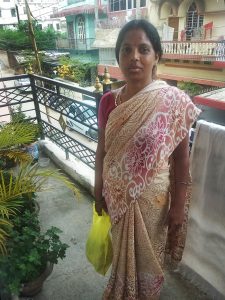People of Bharat: Raksha, Ranchi

Raksha is standing in the balcony of one of the homes where she works as a house help. She agreed to the interview after her employer gave her permission. When I greet her she acknowledges me with a nervous nod. She is a petite, dark-skinned woman in her early thirties (although she looks younger) — she is wearing a saree and is clutching at a yellow polythene bag; the contents of which I am curious to know. Raksha speaks in Hindi with a thick, rural accent which I have trouble understanding. Raksha talks to me with a poker face; evident that she does not want to reveal too much, too soon.
I learn that Raksha is 35 years old and was born to a family of farm labourers in a village of Baktapur district in Bihar. Both her parents worked on others’ farms as labourers. ‘Dusro ke khet me khatkhatana hai. Apna khet nahi. Ghar bhi apna nahin.’ Conditioned to believe women’s work doesn’t count as a contribution, she tells me her mother was a housewife who also went to the fields to weed out the grass, cut the crops, thrash the rice and do other small tasks. The third of four siblings, Raksha never went to school. The six of them lived in a kuccha house (made of mud and thatch) with three rooms. Raksha acknowledges that times were hard and food was scare but the innocence of her childhood kept her free from the worries that plague her now.
Raksha was 10 years old when she started working as domestic help. Married off at 15, she moved to her husband’s house in another village where she stayed with in-laws. Soon after the wedding, her husband left for Ranchi to look for better work. Raksha worked the fields and waited for her husband. ‘My husband’s parents, my two sisters-in-law and myself all slept in one room’. Raksha’s husband tried to earn a living doing menial jobs; later he set up a shop in Ranchi where he sold toffees, cigarettes, small toys, biscuits and other eatables. The hectic pace of the city got to him and he returned to the village a few years later.
The income from farm labour was scarce; they didn’t own land or house as well. These reasons combined with others, forced Raksha and her husband to pack their belongings as once more they turned to the city Ranchi, looking for work. ‘Hum logon ko bahot dikkat tha. Khane ko bhi bahut dikkat tha. Rehneka bhi thikana nahin.’ Raksha’s husband found work as a bus conductor also worked part-time as a driver to make ends meet. ‘He worked all day long and at the end of it, he earned just Rs.50.’ Raksha questions me with a sorrowful look, ‘Are fifty rupees enough to buy groceries, buy milk? We could only buy either vegetables or milk (each day).’
When they first arrived in Ranchi, Raksha, her husband and two sons stayed at the basti in Hinoo area in Ranchi; now they live in a semi-urban chawl house in Bandhu Nagar which they have recently bought. Their sons are now 16 and 14 years old.
Raksha ekes about Rs.4,000 a month from cleaning houses and cooking work. During the festivals she applies alta to female clients and makes a few hundred rupees every season. She walks to work and leaves early in the morning. She returns at 12 pm to have her lunch; usually her sons make her something. If they don’t she cooks for herself, takes lunch and rests. Then she leaves for work again and returns at 7 pm.
Raksha’s husband has set up a small barber shop along the pavement outside their residence area. He starts in the late morning and works till it gets dark. His earnings vary from Rs.100-Rs.300 and he makes about Rs.5,000–6,000 a month. She tells me both her sons study in a government school; she spends Rs. 10,000 annually towards school fees, uniforms and stationary. Her sons take private tuitions which come up to a monthly Rs. 800 per child. Categorized as BPL (Below Poverty Line) by the government, she feels she is still to see benefits. She gets rationed grains, sugar and oil but their consumption is higher so they end up spending substantially on groceries. Raksha has a bank account in her name which was opened under a government inclusion initiative. She has only Rs. 100 as deposit in the bank and does not use it for anything else.
I ask Raksha if she has any savings or life insurance. She tells me a few years ago she was approached by a ‘company agent’. He advised her to save in a scheme which would give her returns after four or five years. Raksha diligently saved Rs. 1000 every month with the agent for three years. ‘Phir company bhaag gaya’ (The agent absconded). Cheated of her life’s savings and determined to buy a house of her own, she borrowed Rs. 80,000 from a samiti (group-lending committee) a couple of years ago. She does not know the rate of interest but knows her annual interest comes up to Rs. 10,000. Raksha is paying Rs. 2,800 in monthly instalments to two different committees — she took the second loan of Rs. 30,000 last year to build a bathroom. ‘It’s not yet completed. The money was not enough.’ I understand that Raksha borrows from informal sources to make her monthly loan payments if she is short of money. She acknowledges that she is under multiple debts. ‘But we cannot stop borrowing because if we do, our children would not be able to study’ she says.
In the village, Raksha and her family had kept a few chickens. In the city, rearing livestock is not an option and she has no other means of having a second income. Her current house has brick walls and a tin roof and has two rooms. She had applied for a house under a government scheme for affordable housing but did not make it. I ask her if she owns any gold. She shows me the gold earrings and silver anklets she is wearing as all the jewellery she owns. Raksha doesn’t mind switching jobs to something better paying but she is not confident she can get anything suitable for her.
Raksha’s husband owns a feature phone which he carries with him. When I ask her about her financial aspirations, she tells me she owns only two sarees. After reflecting a bit, she shares her only one aspiration; that her sons might be able to complete their education. She is worried her financial woes will spill over and affect her sons’ education. ‘Paisa hoga to bacche ko padhaenge warna jaan thodi na de denge?’ (If we have the means we will get our children educated otherwise shall we give up our lives for them?) I ask Raksha about her financial anxieties. ‘Bahot dikkat hai. Jahan dekho udhar dikkat hai. Pareshani to aadmi ka zindagi hai’ she vents. (I have a lot of difficulties everywhere I see. Life means difficulties). She laughs nervously; finally I find she is able to relax a bit into the conversation.
As I leave, I reflect at the irony of Raksha’s name; it means ‘protection’.
[alta] — a red dye applied to the hands and feet for adornment.
[basti] — a settlement of makeshift huts/dwellings usually found at the edge of the city’s limits. The houses would normally not have solid walls being constructed from cloth or tarpaulin.
[chawl] — an urban settlement of slum dwellers. Houses are constructed in and usually share a common wall between them. Tin or asbestos sheet is used as roofing
This research was developed as part of the Bharat Inclusion Initiative.
